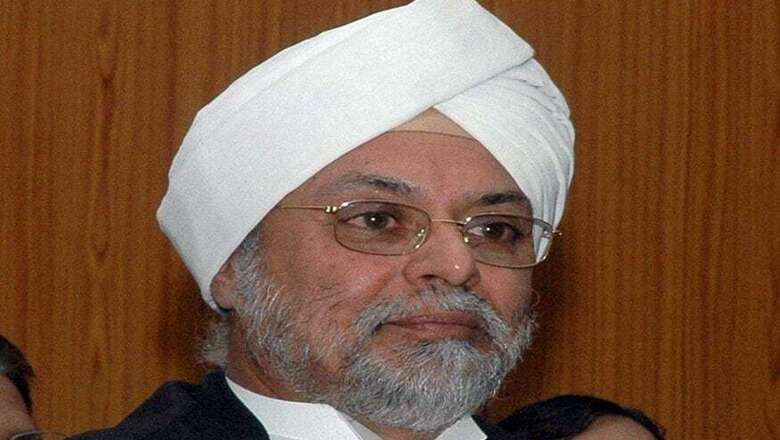
views
New Delhi: Around a year ago, while hearing on judicial appointments, Justice Jagdish Singh Khehar made a remark that took even the Attorney General Mukul Rohatgi – the judge was replying to the AG – by surprise.
“The stakes are high. The pressure is tremendous. Aggressions are high. I have spent years here. Seven to eight years in the Supreme Court is killing,” he said.
Well, looks like he is in for more. Justice Khehar has just been nominated as the next Chief Justice of India.
Khehar will take over from the current CJI, TS Thakur, who retires on January 3, 2017. He will be the 44th and the first Sikh CJI of the country.
And those looking for clues on India’s new CJI can refer to his speech at the Constitution Day celebrated last month – on November 26.
AG Rohatgi, who was a speaker at the function, had suggested the judiciary should not “cross the limits of laxman rekha.” Soon Khehar stood up to speak.
Reiterating that judiciary has always stood well within its limits, Khehar said, “Be it the 39th amendment in the Constitution (placing office of the Prime Minister beyond the ambit of judicial scrutiny) or the latest amendment that had the element of affecting independence of the judiciary (striking down the NJAC), the Supreme Court has struck them down.”
“It has upheld the constitutional ethos and its principles… that, if I may respectfully tell the Attorney General, is our Laxman Rekha,” he said.
A 1977 law graduate from Panjab University in Chandigarh, Khehar (64), enrolled as an advocate in 1979 in the Panjab and Haryana High Court, Chandigarh. He was appointed as Additional Advocate General, Punjab, in January 1992, and then as Senior Standing Counsel, Union Territory, Chandigarh. He was also designated as Senior Advocate in February, 1995.
Khehar is known to be direct and has never shied away from letting the fraternity know what he feels. While addressing a convocation gathering in October, Khehar pointed out the deep roots of corruption and how the judiciary ought to stay away from it.
“India as a country is fighting a long-drawn battle against corruption but somehow it is failing to overpower it because it is a deep rooted menace. The only hope is that the future generations, which if guided properly about the harm it is causing, will be able to combat this disease,” he said.
He was also a judge in the SEBI-Sahara case for a long time. When Common Cause Foundation, an NGO, filed a petition to seek an inquiry into the alleged bribing by politicians based on documents of Sahara and Birla produced by the NGO, he remarked, “Are you relying on Sahara's documents? They never give genuine documents.”
Apart from delivering judgments in various contentious cases in the Supreme Court, the two most landmark cases in which Khehar ruled on pertained to the National Judicial Appointments Commission (NJAC) and National Tax Tribunal (NTT).
In October 2015, Khehar as a part of a five member bench struck down the NJAC Act brought by the NDA government as it threatened the ‘independence of the judiciary’.
“The sensitivity of selecting Judges is so enormous, and the consequences of making inappropriate appointments so dangerous, that if those involved in the process of selection and appointment of Judges to the higher judiciary, make wrongful selections, it may well lead the nation into a chaos of sorts,” he had said.
Even while striking down NTT as unconstitutional, Khehar said that though it was seen as a mechanism to reduce arrears as it would have taken the tax cases from the already burdened high courts to the Tribunal, it could not take away the power of a court and vest the power in something ‘that is not a court by nature.’
Khehar also is not known to take kindly to any sort of disobedience to the court. In 2014, while the SEBI vs Sahara saga saw several orders being delivered, the strongest was by Khehar where he came down heavily on the senior counsels for their ‘posturing antics, aimed at bench-hunting or bench-hopping’.
“During the course of their submissions, learned counsel for the petitioner, chose to address the Court by using language, which we had not heard (either as practicing advocates, or even as Judges in the high courts or this Court) ever,” he had said.
Earlier this year, Khehar left a courtroom “disgusted at the persistent holiday mood of the lawyers.”
At another occasion, Khehar had remarked strongly against younger judges. “I pity those who become judge at a young age, especially if he has 20 years or so as a judge. It is a tough and high pressure job which leads to burnout situation," he said when Rohatgi suggested that the Collegium must consider lowering the age of consideration for advocates from the present 45 years to 40.
Khehar was also a part of the bench which recently gave a landmark verdict holding that the principal of “equal pay for equal work” has to be made applicable to daily wage, casual and contractual employees who perform the same duties as those on regular contract.
On November 18, Khehar was appointed as the new Executive Chairman of the National Legal Services Authority. He succeeded Justice Anil R. Dave. Khehar would retire from the post of CJI on August 28, 2017.




















Comments
0 comment